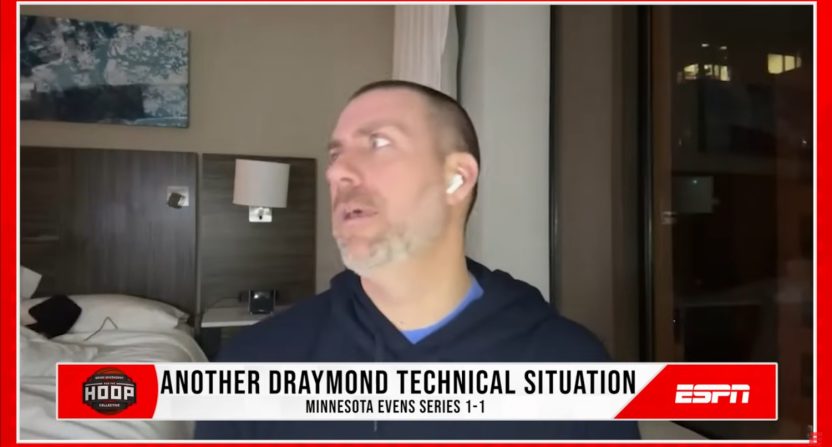Golden State Warriors’ forward Draymond Green’s postgame comments following a loss to the Minnesota Timberwolves Thursday have spurred a lot of discussion. There, after Green was ejected for a fifth technical foul, and after one fan was ejected for directing a racial slur W at him, the often-under-fire Warriors’ star issued a brief postgame statement, including “the agenda to make me look like an angry Black man is crazy.”
There’s been lots of media reaction to that. Awful Announcing’s Michael Grant wrote that Green’s frustrations may have a point, but his record of incidents in games and practices doesn’t hlep his cause. ESPN’s Stan Verrett noted “Being a Black man in America can be a source of constant, justifiable anger at times. …But Draymond Green is still excessive on the court at times. Both things are true.” And ESPN’s Michael Wilbon empathized with Green, saying he’d heard similar “angry Black man” criticisms directed at himself over the years.
One of Verrett and Wilbon’s colleagues took a very different tack, though. That would be ESPN NBA reporter Tim McMahon, who went off on the idea that Green could be a victim at all on the Brian Windhorst & The Hoop Collective ESPN podcast with colleagues Windhorst and Bontemps Friday. McMahon’s key comments there start around the 18:10 mark of the clip below in response to Windhorst reading Green’s comments, with the wider discussion of Green’s on-court behavior beginning back around 11:30:
As Windhorst reads Green’s agenda comment, McMahon rolls his eyes and goes “Oh, God. You know what, go away, Draymond. Shut up, dude. Do not play victim here. Don’t play the victim here. Stop doing flagrant stuff. We’re sick of it! We’re sick of you doing stupid, flagrant crap on a regular basis! It’s not an agenda, Draymond: you get break after break after break after break, and you keep on pushing the line.
“It was not an agenda to make you look angry when you punched your teammate in the face. It was not an agenda to make you look angry when you grabbed Rudy Gobert and put him in a sleeper hold. It was not an agenda to make you look angry when you punched, or smacked or whatever you want to call it, Jusuf Nurkic upside the head.
“And dude, this is why, honestly…I love Ohm [ESPN NBA reporter Ohm Youngmisuk], Ohm is great at his job, but when Ohm came on here and talked about the kindler gentler Draymond, he’s really embracing his counselling…Draymond is full of crap. He’s just so full of crap that his breath stinks. Like what are we talking about here, dude? Please.”
Of course, this podcast was posted Friday morning before the details of the Timberwolves’ investigation into racial slurs against Green from fans became widely known. Thus, Bontemps was commenting based off less information here than some of the people who reacted to the situation later. But at the same time, “Do not play victim here” is quite a thing to say about someone who was literally a victim of racial heckling that saw one fan ejected and the Wolves looking for another fan who may have been involved.
There are plenty of complications to this situation. One is that there’s a major difference between on-court rules violations and actions beyond that. The Gobert and Nurkić situations happened in NBA games, and were punished and highly debated, but there was no discussion of civil or criminal consequences beyond that. Green’s punch of teammate Jordan Poole at a practice went beyond that, and well beyond the lines of the game; it didn’t lead to legal action, but it could have. And the racial heckling of Green certainly crossed a line as well, with the Wolves ejecting a fan over it.
It’s quite fair to discuss Green’s on-court NBA history and if the punishments of him from his team and the league have been severe enough, and that’s much of what McMahon, Bontemps, and Windhorst are doing here. It’s also understandable to bring in the Poole punch and the lack of ongoing consequences Green received there. And that’s been a key factor in takes like Verrett’s, which have noted that while Green may have somewhat of a point about the angry Black man stereotype and the way it’s been used over the years, his actions aren’t helping him get away from it.
But it’s worth noting that even those who break rules or laws can still be victims too. That’s obvious when it comes to on-court play; opponents can’t just constantly foul Green because of his own tendency for fouls. It does matter in discussion of media coverage, too: there can be a conversation about how much media attention Green’s fouls receive relative to other NBA players, how his various media reactions and non-interactions play into that, and more. And there’s also valuable context to consider there around elements like this racial heckling, which may well have informed Green’s postgame comments here. In that light, McMahon’s comments feel over the top.
The format and venue here matters too, of course. Podcasts like The Hoop Collective are specifically designed as a way to get ESPN reporters’ opinions and thoughts, often in a much rawer way than if they were doing a written piece for ESPN.com or a SportsCenter hit. This one was also a fast reaction, and as such, came with less time to consider; indeed, McMahon’s comments came literally as he heard Green’s remarks, as relayed by Windhorst. No one’s saying he and other ESPN personalities shouldn’t give their opinions. But, with all that said, the specific language here from McMahon didn’t hold up well.
